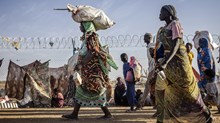Southern Sudan's long-awaited day of political independence will arrive on Saturday, July 9. But the suffering of its people persists.
In the UK media, The Independent, reports, today:
The UN mission in Sudan stands accused of serious failures in its duty to protect civilians who have been killed in their hundreds during a month-long campaign of violence by the Khartoum government on its restive southern border. Eyewitnesses described to The Independent how they saw peacekeepers standing by while unarmed civilians were shot dead outside the gates of a UN base before being dragged away "like slaughtered sheep." They also said that local leaders have been handed over to government forces after seeking shelter with UN officials. The violence has driven tens of thousands of civilians into hiding in the Nuba Mountains, which are controlled by rebel fighters and where public anger at the UN has left peacekeepers afraid to leave their bases, according to officers from the mission's Egyptian contingent.
Two days ago (July 6), Kimberly Smith of Make Way Partners, which is active in southern Sudan with a variety of programs for trafficked, abandoned, or orphaned children, posted on her blog an account (and very graphic images) of recent violence and killing of children in southern Sudan.
During most of June, church and missions leaders spoke out for assistance. According to missionary Fran Boyle, tens of thousands of people are currently displaced in the South, fleeing the border city of Abyei, where the Government of Sudan has taken over. Boyle's ministry, Connecting Lives International Mission (CLIM) is based in Western Aweil along the Darfur border.
In the Nuba Mountains, troops have attacked civilians specifically targeting churches and pastors. "They have burned the churches," said Boyle. "Pastors have fled and the flock is scattered." Pastor Santino Akook of CLIM sent photos of Darfurian refugees who had recently fled to Jorbich in the hope of finding survival supplies. The UN estimates that the recent violence and bombardment has displaced more than 60,000 people.
"The pastors are the most wanted because they are the leaders of the church and at the same time, the leaders of the community," said Anglican Bishop Abraham Nhial, whose Episcopal Diocese of Western Aweil includes the city of Abyei.
"The whole city was destroyed by the Islamic Government in the North. It was put under fire," said Nhial. "All my Christian and community people have been displaced." Right now is the rainy season, and "they are today living on the streets and they have nothing to [use to] cover their heads—no tents or homes to stay in. There is no food or water oraccess to medical care," said Nhial. "Some of them are still missing. Maybe they are somewhere in the bush."
Boyle said that supply routes to Khartoum are now closed, preventing food and emergency supplies from reaching their ministry's location where more than 360 new families arrived in May following renewed violence in Darfur. Joining them are new refugees from Khartoum, who are fleeing the northern capital in anticipation of southern Sudan's declaration of independence.
While her team had food for June, Boyle said the cost is 50 percent more and "we are not sure if there will even be any food next month." In a recent email to supporters Boyle wrote, "Please keep praying and give as you areable."
In the South Kordofan capital of Kadugli, political leaders in this oil-rich city expect to join with South Sudan on July 9.
Bashir's forces also recently attacked in Kadugli. "My office was burned down and the cyber cafe...also [the] cathedral was burned, the Church of Christ was burned as well," Bishop Andulu Elnail, with the Episcopal Church of Sudan, told CBN News in an online article posted June 18.
"My house was fired and my chaplain escaped through a window. He was arrested later and tortured. …[M]y people are scattered. My staff are scattered all over and it really is very terrible."
Meanwhile, other aid workers in southern Sudan are asking for help following attacks there by other militias allied with Khartoum, including theLord's Resistance Army (LRA).
"The government in north Sudan will not change," Nhial told CT."The American government cannot stop war in Sudan by words only. They need action. I'm saying this because more than two million people were lost during the war and the number is going up. We need help, and we need help today. We are dying. We are crying to the world that we need help."
Nhial asked the Western church for prayer as independence day approaches. "On July 9, we are going to be a nation, and we need prayers," he said. "We need to be covered by prayers. We need Christians all over the word to pray for us and rescue us. We are begging them."
* * *
Here are highlights of CT's interview with Smith, author of the new book, "Passport through Darkness: A True Story of Danger and Second Chances":
Q: How has the recent surge of violence in Abyei and elsewhere affected your ministry?
A: Abyei is less than an hour away from our New Life Ministry orphanage. Our children are so terrorized because the Arabs are flying these huge [Russian-made aircraft] to bomb Abyei. They don't have to do this but they do it specifically to terrorize our village—they circle all the way around our village before they go back around to drop their next round. Our 550 orphans–they've all been traumatized. They've all watched their mothers be raped and their parents brutally murdered before we got them in. [Now] they hear the planes coming. They haven't bombed our village yet, but our kids, every time they circle around, have no way of knowing.
Q: You recently blogged about another attack by the Lord's Resistance Army in a different region.
A: Equitoria is where the blog that you read took place. This region is in the south about 700 miles away from Abyei. … Traditionally what [the northern government has] done is hire the Lord's Resistance Army (LRA) to come back across the border from Uganda. The reason they do this is because they cannot effectively get down there. The LRA is happy to do it because they take child soldiers into their evil regimes.
Q: Didn't they earlier capture 300 orphans from the village were you were considering building your Hope for Sudan orphanage?
A: Yes. That's in the village of Moti in Eastern Equitoria. When we're selecting a location where to minister next, one of our criteria is to go where women and children are most vulnerable with the least amount of protection. That almost always ends up being these war zones or lawless lands where this sort of thing takes place. Just two to three days before my team landed there, it had been raided by the LRA. They captured more than 300 children and most of them were orphans.
Q: What is the situation there like now?
A: Romano Nero is the indigenous director for the Hope for Sudan Orphanage. He just sent me some pictures from a slaughter that took place last week—dead bodies on the side of the road. We took in five of the orphansthat had just been left there. They witnessed their mothers' brutal rapes and slaughter. Their mothers were hacked up and left on the side of the road. Romano happened to be coming through. We have five of the orphans now in our home. We took them all, although we're not equipped at that orphanage to take newborns and one of them was a newborn, so he's having that one placed with a local family. We now have almost 50 orphans here with the new ones we've taken in.
Q: You've said there is a lot of confusion over who is responsible for the fighting.
A: The northern government hires the LRA down south to do their dirty work. … In the Nuba Mountains though, it is the Government of Sudan. The GOS rounded [children] up, trained them as soldiers—forced them to become child soldiers—and then drove them back down into the Nuba Mountains. Two weeks ago they set them loose to kill their own people in the Nuba Mountains.The reports we've been getting is that the children first started fighting in chaos but eventually they looked at themselves, they looked at their people, and they looked at the Arabs who'd brought them in, andthey turned the guns on the Arabs. That's the report I've been given from the SPLA.
Q: What do you want to see the U.S.do in response?
A: China is there. Without China pumping the oil and funding the GOS, much of this could not happen. China is our number one trade partner, and although when we negotiate our trade agreement with China the issue of Sudan is on that list—it's way down on the list.

Support Our Work
Subscribe to CT for less than $4.25/month


















